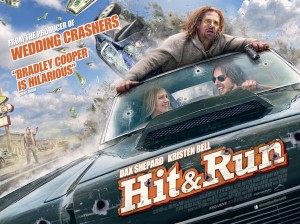“Sexual Violence and Banality at the Cineplex”
Conclusion
These discursive events that describe prison-rape indicate several aspects of what I believe to be a new paradigm for thinking about sexual violence in prison, one that is both informed by the paradigm of the 1960s and departs from it significantly.
First, a majority of adults believes that it possesses some knowledge about the genital activities of incarcerated individuals. Neither the phrase “prison bitch” nor “wizard of ass” explicitly describes sexual violence. Like the honk of the semi-trailer in Hit & Run’s trailer, these phrases do not actually need to describe prison-rape in order to signify it. Audiences are expected to fill in the gaps with their own knowledge, and that knowledge involves an assumption that what happens to men in prison is that they are violated.
Second, prison-rape has become not only funny but banal. As I opened this essay, I detailed a list of jokes that comprise Hit & Run’s trailer. Humor related to male/male sexual violence has clearly become commonplace enough that it can be featured in a widely screened advertisement for a summer action-comedy, but laughs about prison-rape also sit comfortably alongside other jokes – the nudity of the elderly, the combination of Xanax with alcohol, Tom Arnold’s ineptitude with firearms. In this trailer prison-rape is part of a series of laughs intended to appeal to the trailer’s audience, just one more aspect of Hit & Run’s promised montage of attractions, barely noticeable as the terrifying epidemic Alan Davis uncovered in 1968.
If my argument is sound and we are undergoing a paradigm shift for thinking and talking about prison-rape, what we can be sure has not shifted is that USAmericans continue to care very little about what goes on in their country’s prisons. If prison-rape is a good joke – and the ubiquity of the joke ought to be indicative of its success at garnering laughter – the joke works because prisoner-on-prisoner violence doesn’t actually matter to most USAmericans. When Butch in Tennessee Williams’ 1938 play Not about Nightingales complained to his cellmate that “a con ain’t a human being. A con’s a con. He’s stuck in here and the world’s forgot him”, he wasn’t far off the mark. Hit & Run suggests not that we have forgotten about the men we’ve consigned to prisons, but that they’ve become just one more thing to laugh about.



